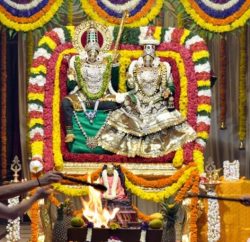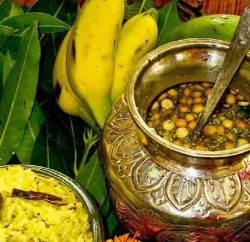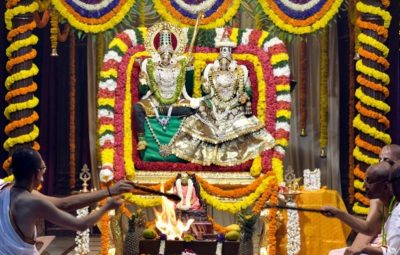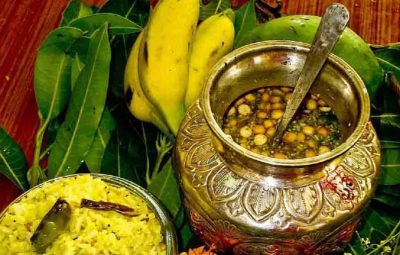Srimad-Bhagavatam points out the importance of Vedic life which helps us get an idea of the real life in the spiritual world.
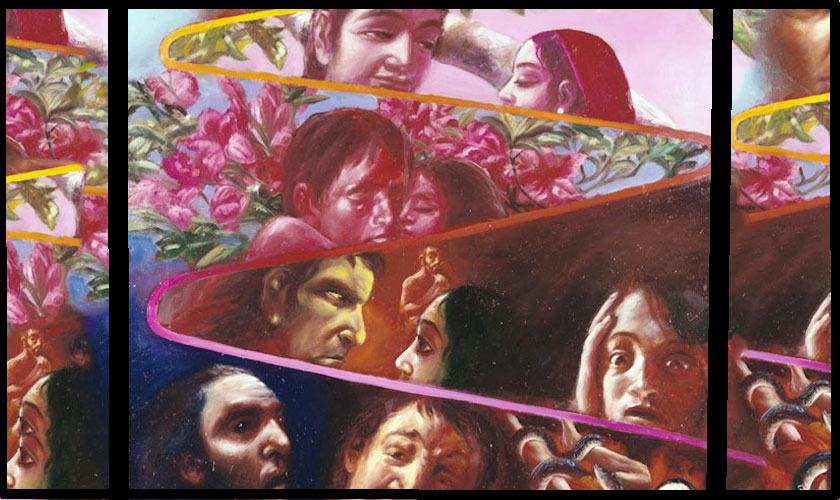
Lecture by His Grace Madhu Pandit Dasa
arvak-srotas tu navamah
ksattar eka-vidho nrnam
rajo ‘dhikah karma-para
duhkhe ca sukha-maninah
TRANSLATION
The creation of the human beings, who are of one species only and who stock their eatables in the belly, is the ninth in the rotation. In the human race, the mode of passion is very prominent. Humans are always busy in the midst of miserable life, but they think themselves happy in all respects.
– Srimad-Bhagavatam – 3.10.26
The human beings stock their eatables in the belly. Fat is always stored in the belly. Whenever you are fasting, the energy you need comes from the fat.
In the purport, Prabhupada is saying that the human beings are more passionate than the animals and thus there is a high level of irregularity when it comes to sex life in the human beings. The animals have due time for sexual intercourse, but the human beings have no regular time for such activities.
A human being is given more freedom and facility to do certain things and not to do certain things too. Because of the pleasure in sexual intercourse or sexual attraction, he thinks that whatever endeavour he is doing is ultimately meant for enhancing that. The fine rasas that are possible in the human form are not possible in the animal form. The entire purpose of the Vedic culture was to give the human being the fine samples of all the possible rasas. In the Absolute world, Krishna is the centre of all rasas. The five rasas – santa-rasa, dasya-rasa, sakhya-rasa, vatsalya-rasa and madhurya-rasa are sampled in a cultured life nicely. In an animal life you really don’t get a sampling. Prabhupada says sexual intercourse is tenth class pleasure. To the human being that is given for procreation, but because he does not have a taste of higher enjoyment or higher rasas, he neither understands nor has any experience. Only in a cultured life, by regulating the same, one can easily understand that these are all perverted reflections of the spiritual rasas. Here all these rasas are terminated and are intermixed with so many miseries.
The scientists have tracked different feelings like excitement, enthusiasm, attraction, reverence, appreciation, etc., of different rasas to different chemicals in the brain.
We all know that these five rasas exist eternally as a basis of enjoyment; they are there in our spiritual memory. The connection between different types of rasas and the corresponding chemicals is because of the Paramatma seated in our heart. He interfaces it and gives spiritual-like experiences; but they are all triggered and conditioned in the brain by chemicals. In the human form of life, we lead a life in this material world by regulating these rasas. So in the process, your spiritual vocabulary is built. A human being can understand what the madhurya-rasa between Krishna and the gopis is, because he has got sampling here, created by chemicals. You experience these rasas as if you are in the spiritual world. At the foundation, we know that these are illusory rasas in the material world. But in the entire process, the mind of a human being can understand the fineness of these rasas. Each one of us has got a loving relationship with Krishna that we have forgotten. This eternal relationship cannot be destroyed; it can only be forgotten. So the entire process of Krishna consciousness is to awaken our relationship with Krishna. As soon as the living entity makes little determination by the association of pure devotees to awaken his relationship with Krishna, the Lord facilitates everything and arranges to learn from guru, sadhu and sastra.
The santa-rasa is appreciation of the Lord in terms of His greatness, opulence, omnipotent nature, kindness, etc. In dasya-rasa, awe and reverence of santa-rasa are still there, but you have added service to the Lord. So santa-rasa promotes to dasya-rasa. A devotee does not want to serve anybody except the perfect personality Krishna. So dasya-rasa includes santa-rasa. In sakhya-rasa, dasya’s servitude and appreciation are there, but the formality of dasya is gone. For instance, Krishna and Balarama fight with all the cowherd boys and then Krishna loses. Whoever loses has to carry the other on the back, so Krishna carries Sudama on the back. Thus there is a sweet exchange of intimacy which slowly begins in sakhya-rasa. Then in vatsalya-rasa little more intimacy, but then one more element is added. The vatsalya rasa is a protective and nurturing relationship. When Krishna opens His mouth, mother Yashoda sees all kinds of stars and everything in His mouth and thinks that something has happened to her son. Then immediately she prays to all the demigods that nothing should happen to Him.
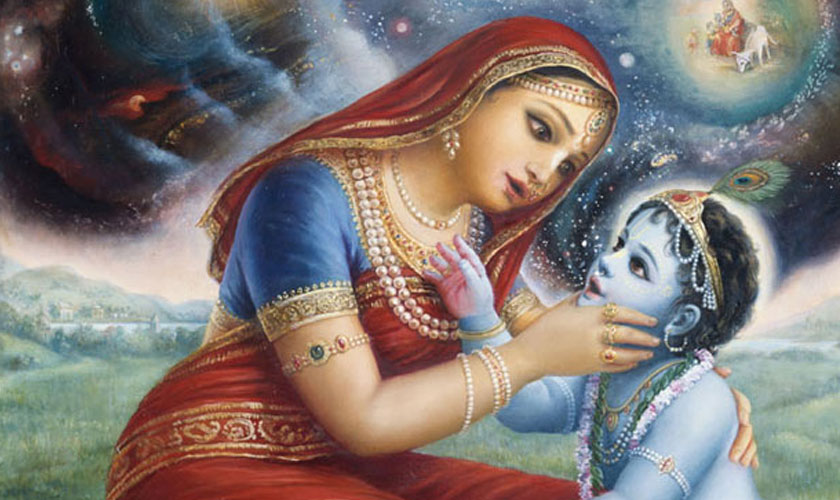
Then in madhurya-rasa, everything is there – formality is broken and there is appreciation for Krishna which is full of care and nurturing. When the gopis see Krishna walking, their heart is pained by the thought of some stone or thorns pricking His feet. They want to lay their bodies down for Krishna to walk on them. The gopis give their body to Krishna – complete surrender, atma-nivedanam.
Bhagavatam says, unless you have a cultured human life you cannot understand the spiritual life. This culturing happens by dealing with all these rasas in a regulated way and that is when duty comes. When it comes to sex life, that is what ties one down to uncultured animalistic life. In the material world, people fall in love with each other for sense gratification. Prabhupada explains that as soon as sense gratification is not there, the relationship is cut. That means in the material world this madhurya-rasa is all centred around me and it is perverted. In the spiritual world madhurya-rasa is that the gopis simply want to give pleasure to Krishna; they are not seeking their pleasure. But they get the highest pleasure. God alone can be in the centre to receive this madhurya-rasa in a perfect manner, because He is the master of all the souls. He is the purusa of all the souls and every atma is a prakrti.
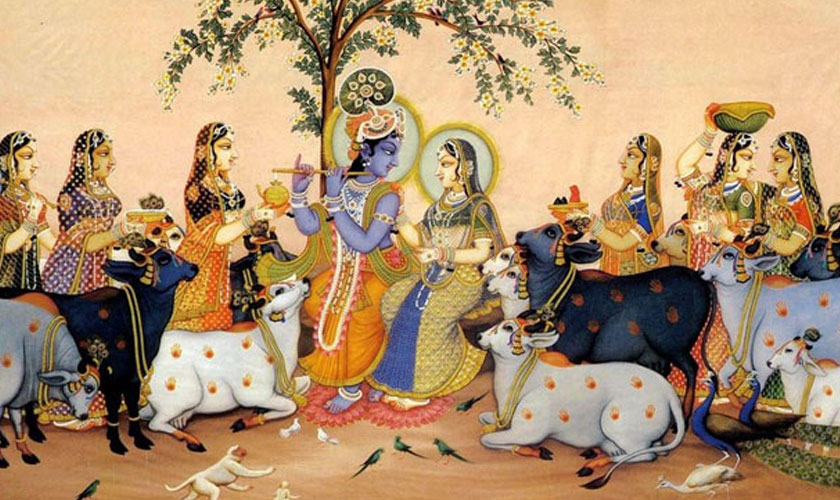
Krishna is kandarpa-koti-kaminiya-visesa-sobham. In the material world, we don’t actually see beauty because there is no beauty at all. Beauty is in beholder’s eyes, they say. It is all chemical experience, because once the chemicals come down, it is gone. But these experiential states created by the chemical are memorised by the brain which captures state of the mind as a memory. You have to have control over your mind. You should not contemplate on the experience. Krishna says in the second chapter of the Bhagavad-gita about recognising a self-realised person who has stopped taking pleasure in the desires created out of mental concoction and who takes pleasure only in the self. So, the principles of brahmacharya are extremely important whether one is a brahmachari or grhastha or whatever. Without practising brahmacharya, there is no question of spiritual life at all. So that is the number one regulation if you want spiritual revelations.
(The above transcripts have been edited for better readability. However, they have not been verified and confirmed by the original speaker.)
His Grace Madhu Pandit Dasa became a full-time member of ISKCON in 1981. Presently he is the Governing Body Commissioner – ISKCON Bangalore Group of Temples, Temple President – ISKCON Sri Radha Krishna Temple, Bangalore and Chairman – The Akshaya Patra Foundation.


